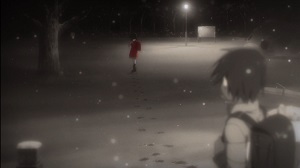written by Laurie Tom
There are a lot of high profile anime series for the 2016 spring season, most of them being returning shows, but the new kids on the block have left me less impressed with only one series becoming a must watch. Ushio and Tora is back though, and that’s a good thing.
Of the new shows, there were six that I found worth checking out.
Ace Attorney
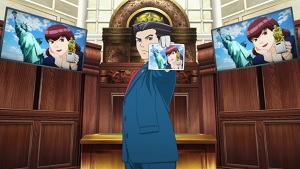
Why I Watched It: I’m a big fan of the Ace Attorney game series, which typically stars the defense attorney, Phoenix Wright (Ryuuichi Naruhodou). He bumbles his way through cases buoyed by sheer determination and a belief in his client’s innocence. The series is meant for humor, with many characters’ names being a series of bad puns. Interestingly enough, there are two sets of subtitles, one which uses the American names (which approximated the puns for English audiences), and one with the Japanese.
What I Thought: I opted to watch the subtitles with the Japanese names so they would match the audio and ended up wondering if that was a mistake as the whole episode (which covers the first trial of the game) did not feel quite as funny as I remembered. It may also be that the nature of the medium, game vs. TV series, did not allow for the same translation flexibility. The adaptation is fairly by the book, offering little for someone who has already played the game, but it’s easy to follow and I think people who haven’t played will be fine.
Verdict: I will probably end up watching it out of nostalgia when I have the time since rival prosecutor Edgeworth (Mitsurugi) is one of my favorite characters ever. The first case wasn’t the strongest even in the game since it was intended as a tutorial, and the real make or break point will be in the second when the female lead, Maya (Mayoi), is introduced.
Where to find stream: Crunchyroll
Bungo Stray Dogs

Why I Watched It: Early 20th century mystery and crime authors work together to solve supernatural mysteries. Sure, there have been variations of this over the years on Western shores, but I haven’t seen any focusing on the Japanese authors of the genre (though I’m told Agatha Christie will later make an appearance).
What I Thought: Despite the fact the authors come from a fairly uniform time period and their costumes are definitely period, this is not a period piece (there’s a modern skyline and modern motorcycles). I’m not entirely sure the members of the Armed Detective Agency are even supposed to be the authors in-universe, but they don’t appear to be named after the historical authors since even the newcomer/audience surrogate is named after an author. Despite a good action sequence at the end between main character Dazai and a giant tiger, the rest of the episode was slow and the humor forced. For some viewers, the fact suicide is used for humor will be offensive.
Verdict: I think I’ll pass. I wanted to like this one, and it’s really hard for me to turn down something with a weretiger who will likely use his transformation abilities quite often, but the show can’t seem to find its legs.
Where to find stream: Crunchyroll
Flying Witch

Why I Watched It: I wasn’t going, probably because of its generic English title, but I was hearing good things about this day to day, slice of life story about a witch in modern times that I decided to give it a shot.
What I Thought: Flying Witch has a Studio Ghibli-ish charm to it, with a young witch moving out to a rural town to live with a distant cousin. Magic simply exists in this world; some people know about it, some people don’t. While it lets Makoto fly on a broom, neither she nor her mundane cousin Kei see it as anything more unusual than being able to play the piano, which lends the opening episode a quiet bit of magic. Sure Makoto is a witch, but before she’s a witch, she’s a teenage girl who wants to make friends and get along with the family members she hasn’t seen in years.
Verdict: I might watch it. Slice of life isn’t my favorite anime genre, but this lightly supernatural take on it has the potential to be a lot of fun with the magic and the mundane combining (the mandrake at the end of the first episode was particularly entertaining). Fans of similar shows will probably be able to jump right in.
Where to find stream: Crunchyroll
Haven’t You Heard? I’m Sakamoto
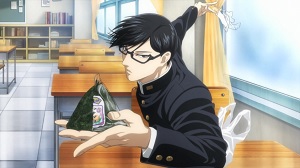
Why I Watched It: At one point this was voted the manga that most needed an anime adaptation. It’s a gag story about an impossibly cool high school student named Sakamoto who is the envy of all the boys and the idol of all the girls. No matter how his would-be rivals try to foil him, they only make him look cooler. Naturally, I want to see if he is that cool.
What I Thought: This isn’t a show I would normally watch and it didn’t live up to the hype. Though Sakamoto does evade the pranks of his classmates in unusual and unexpected ways, and they are as outlandish as I’ve been led to believe, they rarely hit my sense of humor, so there was more eye rolling than laughing. Even though Sakamoto is voiced by veteran voice actor Hikaru Midorikawa, it’s not enough to save him from being a one note character. Sakamoto is intended to be perfect so there’s really nowhere for his character to do. Either the audience is going to enjoy the gags or they’re not and I’m mostly in the latter.
Verdict: I’ll pass. Might work better for fans of slapstick. I’d still be willing to give it a chance in its original form as a gag manga, but it doesn’t have enough meat as an anime.
Where to find stream: Crunchyroll
Joker Game
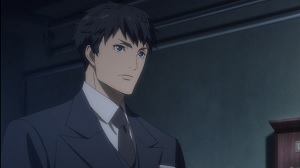
Why I Watched It: I’m a sucker for period pieces, especially any with intrigue in them, so when I heard of Joker Game, I was very interested, because it could be either very good or very bad (in more ways than one). It’s set during a problematic time period, 1937, and stars a bunch of spies. To give this context, WWII is coming in two years to the rest of the world, Japan has already invaded Manchuria, and the Second Sino-Japanese War has just begun. I’m curious how the show will handle the heroes being on the side of the invaders.
What I Thought: The first shot post-opening credits contains a message over the bottom half of the screen saying that this is a work of fiction, events portrayed are unrelated to real world events, etc. I suppose that is at least some acknowledgement of the precarious ground the show is treading. It helps that the spies of D-Agency are specially trained from recruits outside the imperial army and their goal is to provide information to the government and prevent Japan from negotiating from a weak position with western countries (which had happened before in the face of western imperialism). Our viewpoint character is Lt. Sakuma who is a dyed-in-the-wool representative of the imperial army and completely baffled by D-Agency’s unorthodox tactics, which gets him tangled in a trap because he doesn’t understand the concept of or how to play the Joker Game.
Verdict: I’ll be watching. It still has a chance to take a hard turn south, but what it has happened so far has an excellent sense of tension and political intrigue. I like that Sakuma, who embodies the traditional Japanese military mindset (down to the assurance that sacrificing one’s life in the line of duty is expected and even a logical course of action) is ridiculed by the leader of D-Agency, who more or less tells him that his views are stupid and impractical. The opening episode is the first of a two-parter so I’m not sure yet how Sakuma is going to emerge alive from the game between his superior and the spies of D-Agency, but I’m looking forward to it.
Where to find stream: Crunchyroll
The Lost Village

Why I Watched It: It’s a mystery from the mind of Mari Okada, the series composition writer of m3: the dark metal, which I had enjoyed. Thirty people go on a bus tour to a mysterious village that turns out to be deteriorating and uninhabited when they arrive. Naturally they have to find out the truth about it before they can leave.
What I Thought: We don’t get to the village by the end of the first episode, which is probably the biggest disappointment as it robs the episode of a good hook. What we know is that almost everyone on the bus is there to start over so they signed up for the “First Life Do-Over Tour.” Nasaki Village is an urban legend where people disappear as if they were spirited away, but according to the tour guide, what actually happens is that they start new lives cut off from the old, and everyone on the bus is there to do just that. Nearly everyone is using a pseudonym, even if they already know each other.
Verdict: Not sure. I really want to like this one, but the first episode is pretty lackluster and it seems the mystery isn’t going to start until the second episode, since the first ends with the bus poised on the bridge that will finally take them to Nasaki. I’ll probably at least go to the next episode before making a decision.
Where to find stream: Crunchyroll

Laurie Tom is a fantasy and science fiction writer based in southern California. Since she was a kid she has considered books, video games, and anime in roughly equal portions to be her primary source of entertainment. Laurie is a previous grand prize winner of Writers of the Future and since then her work has been published in Galaxy’s Edge, Strange Horizons, and the Year’s Best YA Speculative Fiction.

 “Space Raptor Butt Invasion” is one of the
“Space Raptor Butt Invasion” is one of the 
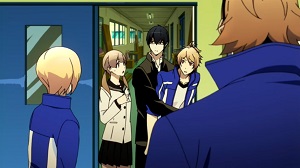 Out of all sports anime I could have watched as my first, I picked Prince of Stride: Alternative because I was a track and field athlete in high school, and the idea of a parkour/relay race would totally have been up my alley.
Out of all sports anime I could have watched as my first, I picked Prince of Stride: Alternative because I was a track and field athlete in high school, and the idea of a parkour/relay race would totally have been up my alley.
